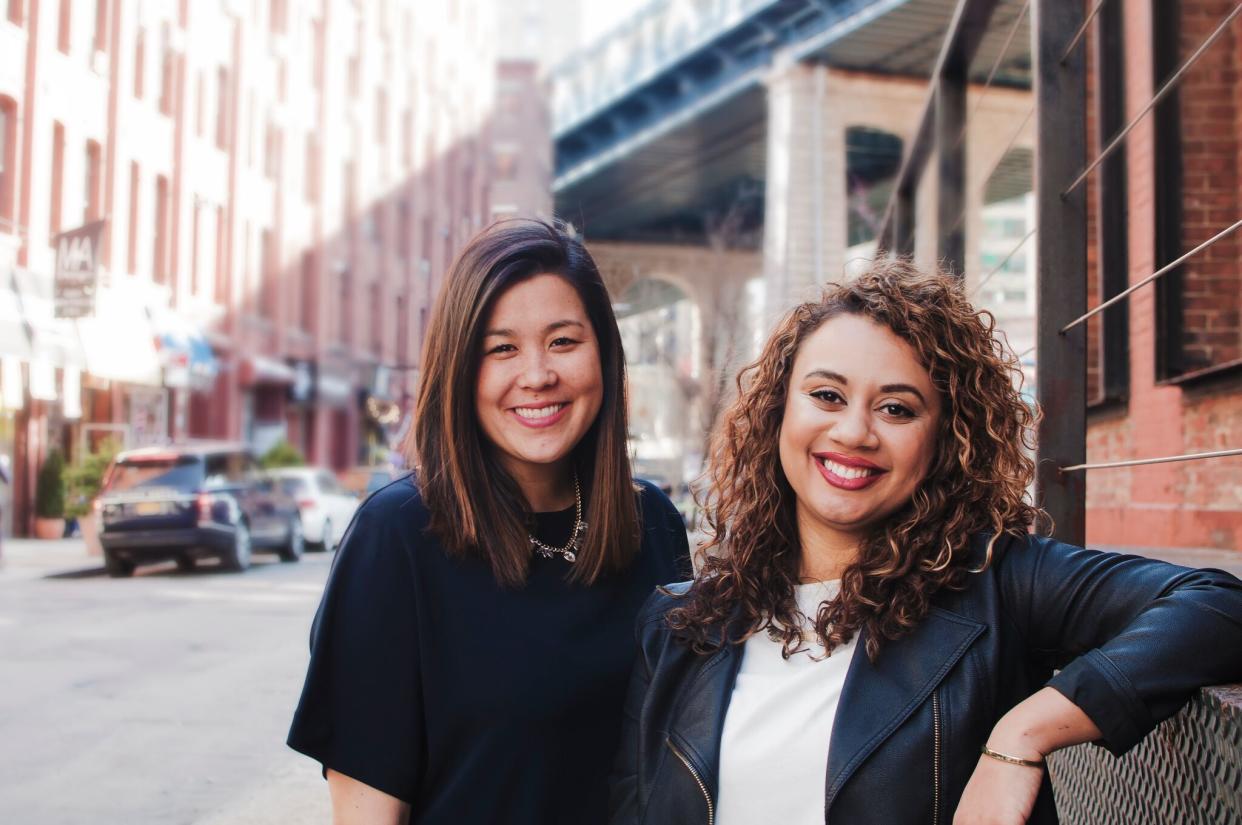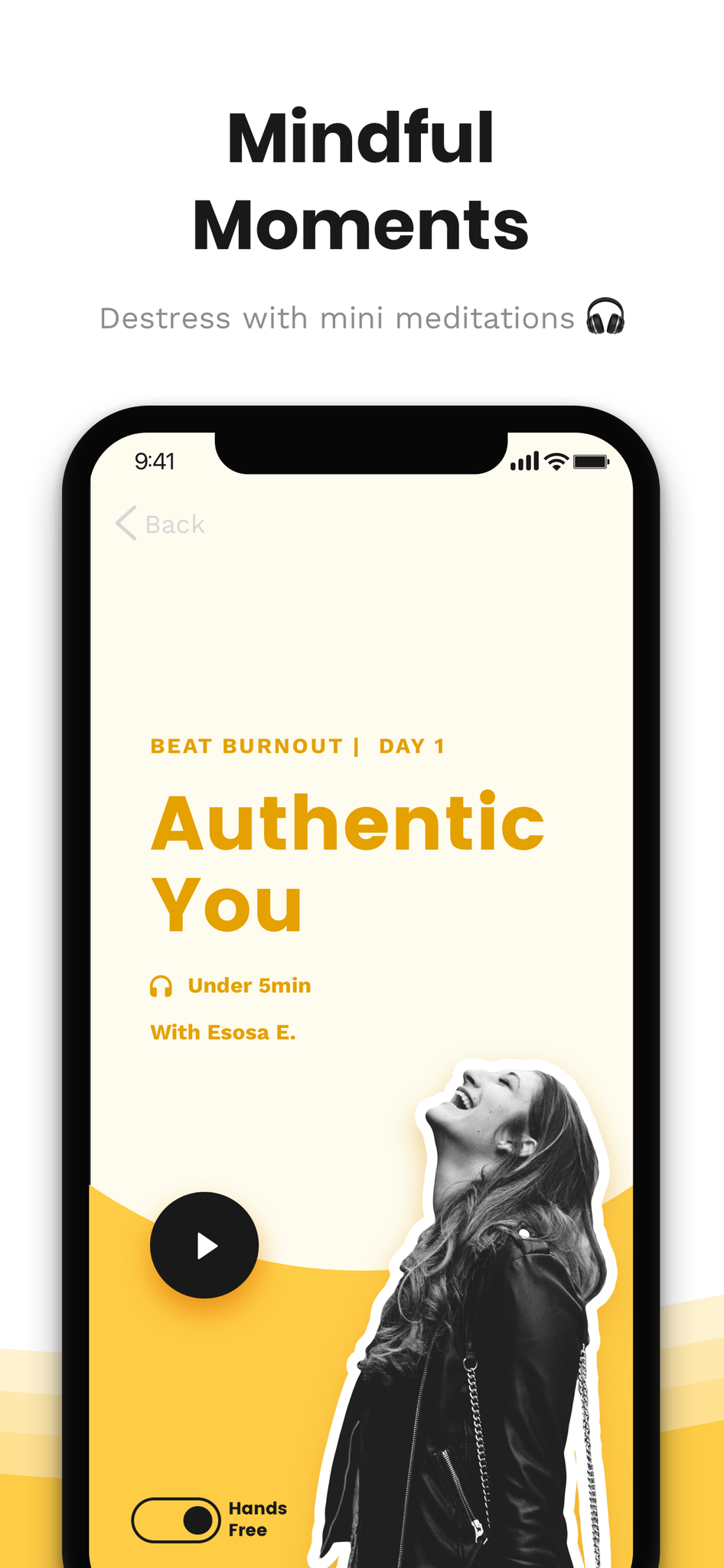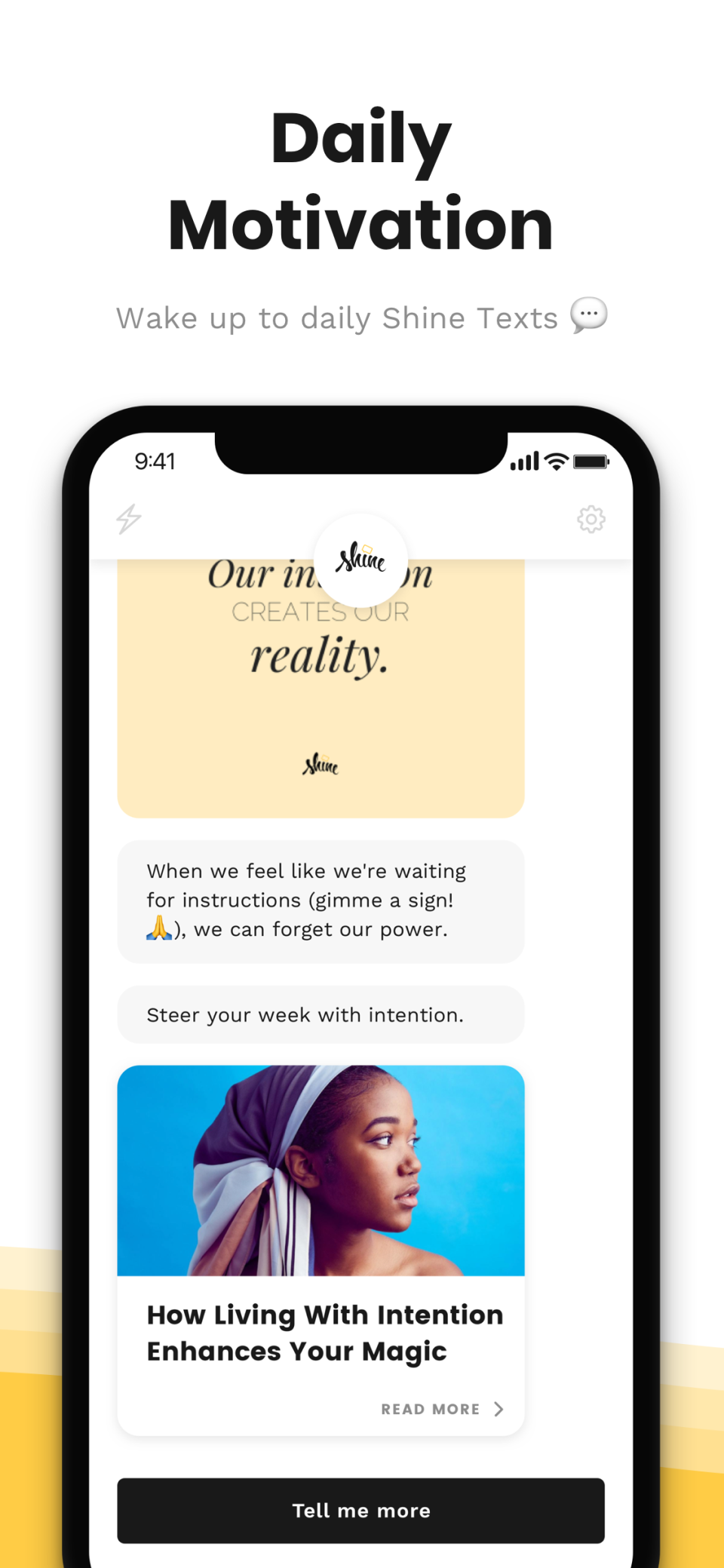7 questions with the founders of Shine, the app that's reinventing self-help

According to research published in October, self-help apps are incredibly effective. Indeed, 90 percent of people surveyed in a Brighman Young University study reported that mental and emotional health apps make them feel “increased motivation, confidence, intention, and attitudes about being mentally and physically healthy.” With that in mind, it should come as no surprise that the startup Shine, which sends daily text messages of encouragement to its users, has amassed over 1 million subscribers since it launched in 2016. It has also raised over $3.3 million in funding. Now, the team behind Shine has moved on to their next iteration: a wellness app.
The app, which launched last week and is free to download (and costs $4.99 per month for premium content), coaches users through problems via meditation and anecdotes and interactive features. It’s filled with challenges, affirmations, advice, and of course those daily messages for which Shine first became known. The two women who started the company, Marah Lidey, 28, and Naomi Hirabayashi, 34, met while working together at the volunteer platform DoSomething. They say they started Shine because they wanted to provide a space for people to air the insecurities and thoughts they didn’t feel they could bring elsewhere. Lidey says they also wanted to counterbalance the image we all project in the social media world. “I’m killing it, I’m doing really well, I’m making money, and having so much fun with my friends. Can’t you see?” she says, imitating our online selves. The flip side to that, Lidey notes, is the reality that none of us really feel like that 24/7, and for many of us, there isn’t an obvious place to turn. That’s where Shine comes in.
The venture has been a success so far, and all signs point to the app being one as well. The women behind the mission are also seeing signs of success on a personal front, with Lidey landing a spot on the coveted Forbes 30 Under 30 list. The women sat down with Yahoo Lifestyle to answer a few questions about Shine, and they shared why they think the app should be the next addition on all of our phones.

Yahoo Lifestyle: Where are you guys from?
Marah Lidey: Savannah, Ga.
Naomi Hirabayashi: Fairfax, Va.
Do you remember meeting each other?
Naomi: I walked up to Marah on her first day [at DoSomething], she was wearing a red shirt, and I was like, ‘Hi, I’m Naomi.’ We didn’t get a chance to meet when she was interviewing — I was out that day — and everyone was raving about her. When I met her I felt like I was meeting a celebrity. I just immediately felt comfortable. She’s someone who is really engaging, someone you want to hang out with, to get to know, and also someone you feel like you’ve known for a long time in a beautiful way. So that was our first meeting, that’s how I remember it.
Marah: When you start a new job, I talk about this a lot with friends, it’s one of the hardest things in life, and people very much underestimate that. It just takes time to acclimate to anything new. So you start, and you feel like you’re in someone else’s skin. I was really excited about the big job I had gotten, but I definitely had the “Am I doing this right?” feeling. What I loved about Naomi is that she made me feel like I was doing it right. She made me feel accepted and supersupported. In your early career, you are always looking for someone to give you validation and make you feel comfortable. Having another woman, and a woman of color, who was in an amazing leadership position was great. Naomi was also the person you wanted in every meeting; she was incredibly thoughtful and strategic, but also very energetic and solution-oriented.
Where did the idea for Shine come from?
Naomi: We actually launched Shine while we were working together at DoSomething. We had teamed up together on a project, and spent a lot of late nights together at work. It was on one of those late night when we were just talking, just [emotionally] leaning on each other and talking through things that were going on in our lives. We had felt for some time, like, “I wish there was more of this. These conversations.” When we looked at a lot of the wellness and well-being verticals that were out in the world, it felt like those conversations and the way we talked about what was going on in our lives weren’t reflected. Everything we were seeing in the space felt very bougie, very much like something that you do when you have time for it, versus how we actually experience our well-being, which is every single day all the time. We took a step back and were like, what if we just sent a text? Because that’s what we did at DoSomething. We had scaled texting from 0 to 5 million and realized the power of it — texts have a 98 percent open rate — and we asked ourselves, what if we did texts, but for well-being? We did a prototype for 50 people and sent it out. We also did weekly surveys for a month. It was the response to those surveys that very quickly made us realize that this was more than just a side project or a cool idea. It was actually something that was needed and that we needed to go forward with.
A post shared by Shine (@shinetext) on Sep 22, 2017 at 4:16pm PDT
What was the first text Shine ever sent?
Marah: It was about the feeling of being behind, and feeling like you’re not where you’re supposed to be, whether that’s physically — you’re running late for a meeting or running behind on something (we all know that sweaty, on-the-train feeling) — but also just feeling behind in life and that you haven’t achieved what you should have achieved by now. It’s a topic we still hit on a lot because it certainly still resonates.
You have an idea and you’re like, “I want this for myself, and I know that it would resonate with me. I have no idea if it would resonate with other people, but let me just try it.” And I’m really proud of us for doing that because there’s so much inertia in starting something, and there are so many good ideas that just get left on the table because we think it needs to be perfect. If we would have known that Shine would reach a million users and have all this success, then of course we would have started it even sooner. But I’m proud of the fact that we were like, “We don’t know, but we know texting like nobody else in the industry.” We scaled it across the U.S., U.K. Brazil, Mexico, Canada, five countries in Africa. We have a really clear understanding of what it looks like to globally launch and scale a really engaging experience that feels like a friend in your pocket. That felt like a really big differentiator. The first reaction that we got from people was “holy s***, I can’t believe this didn’t exist before. This is fundamentally changing my mood, I feel better on a daily basis.” We had people starting Shine circles in the second week of our prototype, where they were essentially getting around the table with people that they work with and they’d do a “Shine break” and talk through the theme of the day. Obviously that validation felt good, but it also made clear that there was so much more here. It very organically grew from there, until we were like, “we’ve gotta quit our jobs.” We had to explore what was here.
A post shared by Shine (@shinetext) on Aug 26, 2017 at 11:25am PDT
And did you raise money right then?
Naomi: We raised two rounds. We didn’t go to business school. We had worked at startups, but obviously hadn’t spent a lot of time in the venture capital (VC) space. Looking back, we didn’t realize how impressive and amazing it was that we were able to raise a round on the side. We had our full-time job, and we would take meetings at lunch. We’d take our vacation days and go pitch. We were very transparent with DoSomething, and they were very supportive. We were so motivated by the response we were getting from the community to make this happen.
Marah: In 2015, when we started, there was not a lot of content about wellness, just in general. And if there was, it was very narrow-minded in terms of what people’s experiences looked like. It was like, “Do you have time to go on sabbatical or do a juice cleanse?” Some people have clearly doubled down on that, and there’s a market for that. But there’s also a huge market for people who YouTube influencers resonate with. The whole reason those people rose to fame is that they’re normal, or more normal than the Photoshopped celebrities we are used to seeing, and they are in your room and in your kitchen and talking to you, in a way that just feels really accessible. If you think about how many people don’t get a text, sometimes in their morning or in their day — living in big cities, like we do, you can normalize really quickly what social life is like, but for us, isolation and representation and making sure people didn’t feel alone was so important to us. Coming into a VC pitch with that, you’re definitely coming at someone who maybe hasn’t thought about this before, but I think the proof has always been in the pudding. When we show the traction we’ve built and what we’ve heard from our users, that helps get anybody onboard.

Why should people download the app? What can they expect from the app every day?
Naomi: It just makes it easier for you to take time for yourself in a way that works for your day. And that comes to life in the app in two ways. First you can get the Shine text, a daily message that makes it easier for you to work on your well-being, and it sounds like it’s coming from a friend. It’s not some intense thing that you have to digest and you’re like, “Oh, great. Here’s another thing I don’t have time for.” We’ve put so much time and energy and passion behind making sure it feels really inclusive and reflects what the average day really looks like for people. It’s quick and it’s bite-sized and its actionable. The second thing you’ll get are mindful moments, which are quick audio tracks, a modern take on meditation. Everything from advice on “help, I have a toxic friend,” to self-care and online dating, to beating burnout. But all done in a way that really talks to you like a friend. It’s talking about these issues we face every day in a very real way, a very accessible way. It’s moments throughout the day that you don’t have to take a ton of time for, but you recharge, and they help you focus on yourself. We all need that now more than ever.
What comes next for Shine?
Marah: The app is a huge brand extension, and it’s the next level for Shine in showing that a daily text is powerful. We’ve always seen the vision of Shine and what it looks like to change the world, around our openness to talk about the things we struggle with and how we work on ourselves with self-love and self-compassion. Shine text has always been an entry point into that and a really exciting differentiator. This friend-in-your-pocket concept is this first product, and now the app, the second product, together are incredibly strong. Next up you’re going to see us evolve and iterate on those products and bring new products to our demographic.
Download Shine here.
Read more from Yahoo Lifestyle:
5-year-old survivor of Texas church massacre just wants Christmas cards for the holidays
Couple married for 47 years goes viral — but it’s their love story that’s warming hearts
Follow us on Instagram, Facebook, and Twitter for nonstop inspiration delivered fresh to your feed, every day.

 Yahoo News
Yahoo News 

